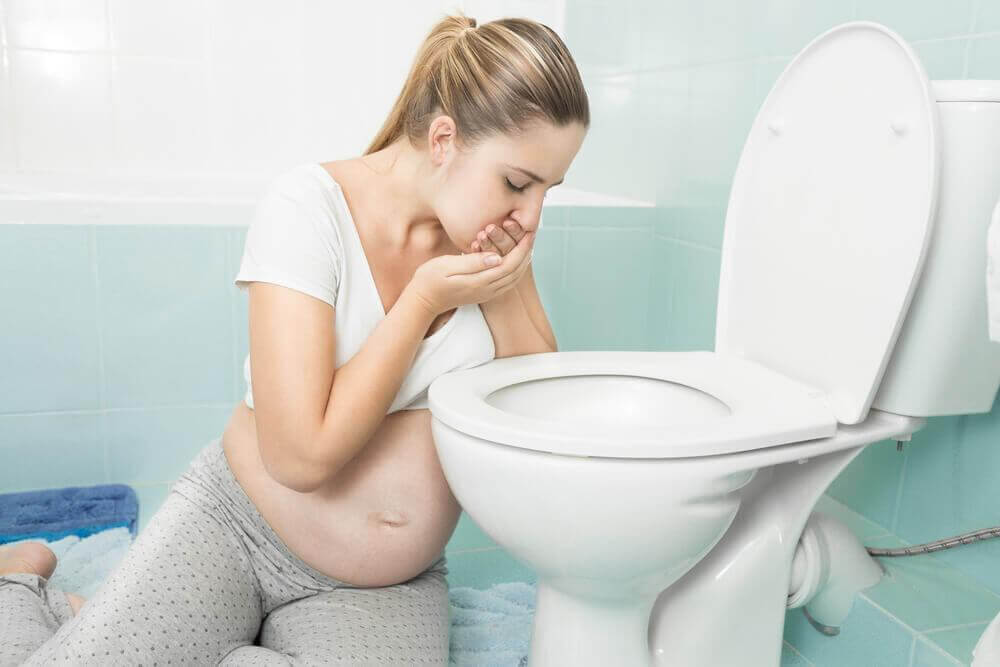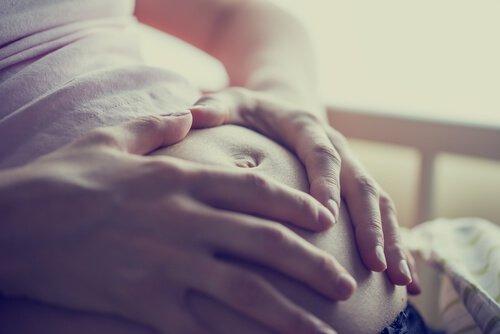Can Crying During Pregnancy Affect Your Baby?

During pregnancy, women are more sensitive to external factors. Consequently, crying during pregnancy becomes habitual during the gestation process. This usually causes future mothers to worry since it could affect the baby. Therefore, it’s important to know how crying affects your pregnancy.
Believe it or not, crying has some health benefits, such as producing well-being, eliminating toxins and releasing stress. Sometimes, after crying, you can clearly see the solution to your problems and your mood can improve. This can make the mother feel motivated.
In this article, we’ll take a look at all of the effects of crying during pregnancy.
Why is Crying During Pregnancy so Frequent?
Below, we’ll talk about some of the most common reasons for crying during pregnancy.
Fatigue
Due to nausea, hormonal changes and their constantly growing belly, pregnant women have more difficulty sleeping, and this leads to them being tired all the time. The desperation of not having energy during the day can cause the mother to find release by crying.

Hormonal Changes
In order for the process of pregnancy to be carried out efficiently, the mother’s hormones are altered. These changes are most noticeable during weeks 6 and 10, and at the end of pregnancy. It should be noted that this process can affect the brain’s chemistry, causing changes in mood.
Insecurities and Fears
Obsessively thinking about the difficulties that the baby could have can also cause the mother to cry. The worries that most plague first-time mothers are having a miscarriage or that the baby might have problems.
On the other hand, weight gain and swollen hands and feet often make the mother feel sad and insecure. She may even think that her partner will no longer want her as she is. It is true that these signs mean that the baby is developing properly, but many mothers still become concerned about her physical appearance.
Problems with her Partner
Having a child is a drastic life change. Therefore, making the decision to start a family is not easy and can bring conflict. There may also be concerns and doubts when preparing the home for the baby’s arrival.
Considering the mood changes in addition to all the decisions that must be made, it’s probable that the future mother will have a big eruption of mixed emotions and the only way for her to find relief will be through crying.
How Does Drying During Pregnancy Influence Your Baby?
Crying for the reasons mentioned above is fine and normal. However, crying because of stress or depression or being constantly depressed and in a bad mood could be detrimental to your baby’s development.

A Baby’s Brain Development
Depression during pregnancy influences the baby’s growth by affecting the baby’s neuroendocrine system. This controls one’s mood, emotions and stress response. In addition, it increases the chances of the child developing mental illness.
You must read: Understand the Negative Effects of Stress
Premature Birth or Miscarriage
Crying because of anxiety reduces blood flow, which serves to transport nutrients necessary for the baby. This can cause respiratory problems, a weight that is below the recommended amount, and, in the worst case, a premature birth or a miscarriage.
The Child’s Ppersonality
When a mother cries as a result of being stressed, her cortisol levels greatly increase and the functioning of the placenta is affected. If this happens, it can be harmful for the baby since one of the functions of the placenta is to protect the fetus from cortisol.
This can have a negative affect, increasing the risk of the child developing behavioral problems such as hyperactivity, Attention Deficit Disorder or other mental diseases.
Slow Development
If the mother has prolonged states of sadness accompanied by crying, it can cause the baby to develop at a slower pace than usual. This is because babies, even when they are in the womb, are able to perceive the moods of their mothers.
How to Prevent Crying During Pregnancy
To keep sadness and stress from taking control of your life, it’s recommended that you exercise, rest and follow a healthy diet. Also, doing activities such as prenatal yoga and meditation will help you to clear your mind and release stress.

Talking about your emotions with your partner, family and friends will help you find relief. In addition, they’ll become more understanding and will even help you with everything you need.
You can also attend prenatal classes so you’ll know what to expect, and you’ll meet other mothers who are going through the same thing.
Conclusion
Your baby is the best thing to happen to you. She or he will fill you with love and happiness.
Remember that you and your child are connected; therefore, taking care of yourself will have great benefits for you and your little one. Don’t let anything or anyone affect your happiness.
On the other hand, if you consider that you’ve tried everything and you can’t control your tears, it’s best to meet with a psychotherapist. They’ll give you useful information and tools so that you can manage your emotions and prevent crying during pregnancy.
All cited sources were thoroughly reviewed by our team to ensure their quality, reliability, currency, and validity. The bibliography of this article was considered reliable and of academic or scientific accuracy.
- Gračanin, A., Bylsma, L. M., & Vingerhoets, A. J. (2014). Is crying a self-soothing behavior?. Frontiers in Psychology, 5, 502. https://www.ncbi.nlm.nih.gov/pmc/articles/PMC4035568/
- American Pregnancy Association. (n.d.). Cambios de humor durante el embarazo. https://americanpregnancy.org/es/pregnancy-health/mood-swings-during-pregnancy/
- Pariante, C. M. (2014). Depression during pregnancy: molecular regulations of mothers’ and children’s behaviour. https://portlandpress.com/biochemsoctrans/article-abstract/42/2/582/66955
- Mojica-Perilla, M., Redondo-Rodriguez, S., & Osma-Zambrano, S. E. (2019). Depresión y ansiedad prenatal: una revisión de la literatura. MedUNAB, 22(2), 200-212. https://revistas.unab.edu.co/index.php/medunab/article/view/2820/3124
- Khashan, A. S., Abel, K. M., McNamee, R., Pedersen, M. G., Webb, R. T., Baker, P. N., … & Mortensen, P. B. (2008). Higher risk of offspring schizophrenia following antenatal maternal exposure to severe adverse life events. Archives of general psychiatry, 65(2), 146-152. https://sid.usal.es/idocs/F8/ART12782/higher%20risk.pdf
This text is provided for informational purposes only and does not replace consultation with a professional. If in doubt, consult your specialist.








